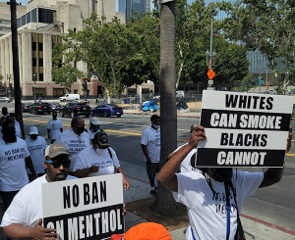By 2 Urban Girls
Contributing Writer
LOS ANGELES — The City Council voted June 16 to direct the city attorney to draft an ordinance to ban flavored tobacco and menthol cigarette sales in the city, but exempted hookah tobacco products at existing smokers lounges.
Under the proposed ordinance, which will be drafted and come back to the City Council for final approval, existing smokers lounges will be able to sell hookah products for on-site or off-site consumption, but the city’s 4,500 tobacco retail stores will be banned from selling flavored tobacco, including hookah tobacco.
Members of the Southern Christian Leadership Conference, Neighborhood Forward Los Angeles and tobacco and hookah retailers protested outside of City Hall the day before the vote to argue that menthol cigarettes should be exempt from the ban.
Organizers of the protest released a statement outlining what they wanted.
“Our opposition is to stop the L.A. City Council from taking the right of choice from African Americans and Latinos to smoke and the unintended consequences of the city to pass this motion that will adversely impact communities of color.
The group included 120 people who expressed concern the council was engaging in a form of voter suppression as a proposed statewide ban, under SB 793, was postponed from implementation as opponents of the legislation gathered the required signatures to put the issue before voters in 2022.
“Our fight is not against the health disparities, but to allow previous … to stand, [to] allow citizens to choose what they feel they want to smoke; and to implore the 15 members of the council to allow the state to go through its Democratic process with SB 793 as it goes before voters next November.”
The council was initially scheduled to include an exemption in the ban for menthol cigarettes, but the City Council’s three Black councilmen, Mark Ridley-Thomas, Marqueece Harris-Dawson and Curren Price, proposed an amendment to remove the exemption for menthol cigarettes, citing the high rates of Black people who smoke menthol cigarettes.
“History has shown us clearly what harmful effects menthol cigarettes have had, particularly on the African-American community,” Ridley-Thomas said in a starement. “It is up to us to prevent the repetition of such racial injustices and health inequities.”
According to the Centers for Disease Control and Prevention, the tobacco industry “has aggressively marketed menthol products to young people and African Americans, especially in urban communities.”
The amendment passed with 14 yes votes and one absent.
Racism has been declared a public health crisis, which disproportionately effects minorities, and a ban on flavored tobacco products is perceived to be a precursor to unfortunate encounters with law enforcement whose will be responsible for enforcing the law
A recent viral video from Ocean City, Maryland, showed police officers attempting to enforce a vaping ban on a popular boardwalk.
The ACLU of Maryland released a statement condemning Ocean City police officers for “show(ing) a complete lack of humanity towards these Black children” and said “these incidents are a manifestation of the white supremacy endemic to U.S. policing.”
Police encountered a group of Black men vaping on the boardwalk and approached them, stating they could only smoke in designated areas. Officers allege, that after being warned, the young men began to use the vape pens while walking away.
Police allege Brian Everett Anderson, 19, Kamere Anthony Day, 19, and Jahtique Joseph John Lewis, 18, became disruptive and resisted arrest.
Videos show the teens being Tased, and hog tied, which city officials claim is allowable.
Ocean City officials pledged to review the officers’ actions but also noted in a news release, “Our officers are permitted to use force, per their training, to overcome exhibited resistance.”
In the city of Los Angeles, police officers came under fire for use of less lethal projectiles to disperse crowds related to protests over police brutality. Activists fear the same heavy-handed approach will be used against Angelenos should a tobacco ban be put in place.
USC law professor Jody Armour continuously speaks about the unintended consequences of a tobacco ban that would disproportionately affect African Americans by resulting in more traffic stops.
“The road to hell is paved in good intentions,” Armour said. “We can’t criminalize our way out of social problems.”
Armour has explained the court’s interpretation of “pre-text stops” as being constitutional, which ultimately gives law enforcement the ability to stop a motorist for a simple infraction as a non-working taillight. This proposed ban would also fit the criteria of “pre-text” stops for simply possessing a cigarette.
The city of Inglewood, regularly conducts underage decoy operations focusing on tobacco retailers selling tobacco products to persons under the legal age.
The funding comes from the Office of the Attorney General, and California Department of Justice Tobacco Grant Program.
According to a press release issued by the Inglewood Police Department, the operation is to reduce the availability of tobacco to underage individuals because of the associated health risks.
Some Inglewood tobacco retailers began receiving citations for selling and furnishing tobacco to minors in violation of penal code 308(a), which is a misdemeanor.
City News Service contributed to this story.
2 Urban Girls is a freelance reporter for Wave Newspapers who covers the Compton and Inglewood areas. She can be reached at 2urbangirls@gmail.com.











